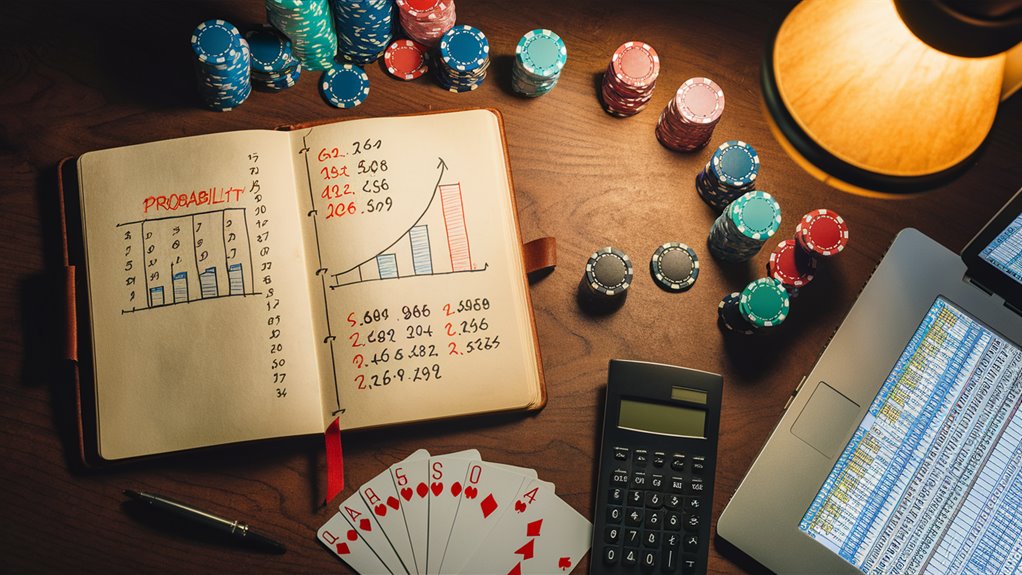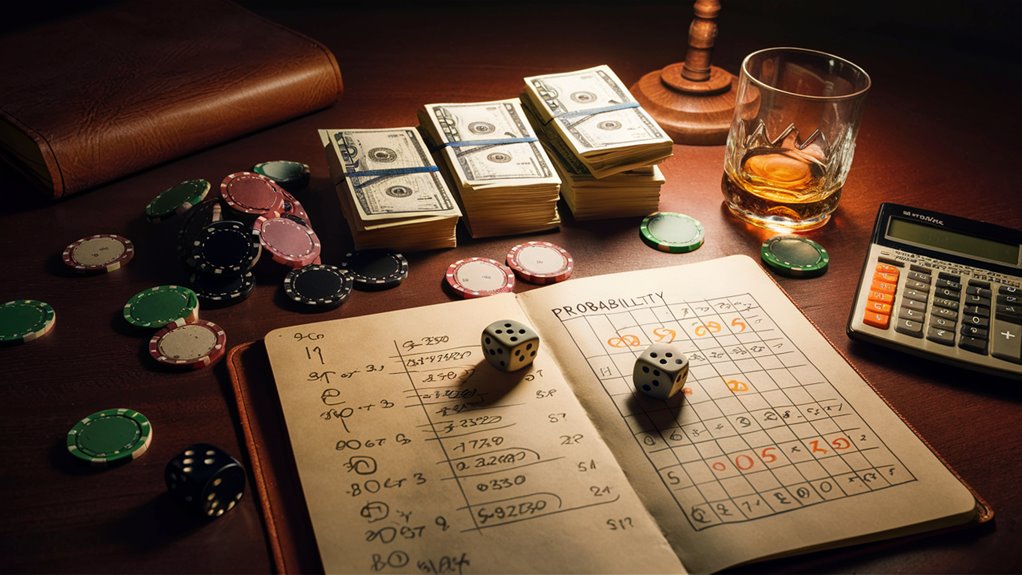
How to Use Math to Get Better at Betting

Math provides effective ways to create smart betting strategies by utilizing numbers, chance, and stats. Understanding key mathematical concepts aids players in making better choices and recognizing opportunities in various casino games. 신뢰할 수 있는 리뷰 보기
Math Basics for Better Betting
Expected Value (EV) assists in making betting decisions that can lead to profits. By assessing house edge rates and probability combinations, players can identify games with favorable odds. For instance, European roulette offers a 48.6% win chance on red/black bets, while using the blackjack basic strategy reduces the house edge to just 0.5%. Baccarat banker bets come with a minimal 1.06% house edge.
Deep Chance Work and Risk Keeping
The Kelly Criterion helps manage money by determining the optimal amount to bet based on mathematical principles. It calculates the ideal portion to risk by considering the edge and probabilities. Effective performance tracking supports maintaining and growing your bankroll.
Better Your Odds with Stats
Utilizing stats aids in identifying bets where you can expect to win more frequently than you lose. Understanding probability math across various games allows players to:
- Determine precise odds and payback rates
- Identify favorable betting styles
- Recognize advantageous game conditions
- Monitor stats efficiently
- Implement informed number-based betting strategies
By adhering to these numeric strategies, players can make rule-based rather than emotion-driven bets.
Know Chance and Odds
Understanding Chance and Odds in Gambling Math
The Base of Betting Math: Chance
Chance is the foundation of all betting math.
The combination of theoretical probability and actual probability provides the precise likelihood of outcomes in any betting game, affecting mathematical expectations when placing bets.
Calculating Simple Probabilities
The main probability formula works as follows: favorable outcomes divided by total outcomes.
Notable examples include:
- Six-sided die: 1/6 probability for each number
- Deck of cards: 4/52 (1/13) probability of drawing an ace
- Card game math: Number of favorable cards/total remaining cards
Converting Probability to Odds
Calculating odds is crucial for identifying advantageous bets. This transformation involves:
- Representing the ratio of unfavorable to favorable outcomes
- Example: 1/4 probability converts to 3:1 odds against
- Evaluating house odds versus real mathematical odds
- Identifying bets with positive expected returns
Understanding these mathematical rules allows you to assess betting opportunities and identify chances to gain profitability.
The integration of probability math and odds informs betting strategies and risk perception.
Understanding Expected Value
Knowing Expected Value (EV) in Gambling Math
The Core of EV
Expected value math forms the foundation of informed gambling decisions.
This calculation multiplies potential outcomes by their probabilities and sums them together.
Strategic betters seek positive EV opportunities, where math suggests net gains exceed zero, yielding profits over time.
Basic EV Calculation
Consider this essential example: A $100 bet on a coin flip pays $110 for heads and loses $100 on tails. The EV calculation is as follows:
- Heads: 0.5 × $110 = $55
- Tails: 0.5 × -$100 = -$50
- Total EV: $55 + (-$50) = $5 positive expectation
Advanced EV Applications
Complex Game Situations
Proficient betting requires considering multiple possibilities simultaneously. In blackjack, players must evaluate EV across numerous scenarios:
- Dealer’s face-up card probabilities
- Player hand combinations
- Decision options (hit, stand, double, split)
- Probabilities for each option
Maximizing Wins
The optimal betting strategy emerges from consistently selecting the highest EV move in every situation. This calculated approach:
- Reduces house edge impact
- Increases long-term profits
- Fosters consistent winning strategies
- Relies on mathematical assistance
Examining House Edge
Comprehensive Understanding of House Edge

Defining House Edge
House edge describes the mathematical advantage games provide to the casino, ensuring profitability over time.
This critical number indicates the expected loss for players and varies significantly across games.
Calculating House Edge
The primary method for calculating house edge involves:
Average Loss per Bet ÷ Initial Bet = House Edge Percentage
Common House Edge Percentages
- Blackjack: 0.5% with optimal strategy
- American Roulette: 5.26%
- Slots: 2-15% range
- Baccarat: 1.06% on banker bets
- Craps: 1.36% on pass/come bets
Calculating Expected Losses
To estimate your hourly expected loss, apply the following formula:
Average Bet × House Edge × Bets per Hour = Expected Loss per Hour
Example Calculation
For blackjack:
- Average bet: $25
- House edge: 0.5%
- Hands per hour: 70
- Expected loss per hour: $25 × 0.5% × 70 = $8.75
Selecting Your Casino Strategy Appropriately
Understanding house edge percentages helps in:
- Choosing games judiciously
- Managing your bankroll effectively
- Making informed betting decisions
- Accurately assessing potential losses
- Planning more effective betting sessions
Tracking Stats and Records
Stats for Data-Informed Betting Analysis
Essential Numbers and Documentation
Advanced bet analysis requires meticulous record-keeping to establish a solid betting foundation.
Must-have data should encompass:
- Wins and losses
- Average bet amounts
- Playing durations
- Performance in individual games
Effective Number Tracking and Pattern Recognition
Employing reliable data tracking methods through specialized software or detailed spreadsheets allows thorough statistical analysis.
Components of effective record keeping include:
- Fluctuations in wins and losses
- Winning and losing streaks
- Frequency of player returns on investment
- Game-specific metrics
Monitoring these key statistics reveals distinct patterns in betting behavior.
Data analysis often uncovers valuable insights, such as long-term performance trends or the efficacy of specific betting strategies at different betting levels.
Improving Performance through Data
Statistical analysis assists betters in:
- Identifying optimal playing times
- Recognizing the best game variations
- Adjusting strategies based on concrete data
- Determining betting amounts wisely
- Pinpointing moments of peak performance
Maintaining accurate records and regularly reviewing them enables players to create data-driven strategies, increasing profits and minimizing unnecessary risks.
Smart Money Management Math
Smart Money Management Math for Professional Betting
The Kelly Criterion: Foundation of Intelligent Betting
The Kelly Criterion is a fundamental mathematical framework for effective bankroll utilization in professional betting.
This sophisticated math calculates the optimal bet size with the formula: bet size = (bp – q) / b, where:
- b = odds you receive
- p = probability of winning
- q = probability of losing
Prudent Bankroll Division and Unit Sizes
Responsible bankroll management entails dividing your total funds into 50-100 betting units.
For example, a $5,000 bankroll split into 100 units results in $50 betting units. This mathematical strategy helps:
- Safeguard against significant losses
- Maximize potential profits
- Mitigate risks
Risk of Ruin
The Risk of Ruin (RoR) calculation measures the likelihood of depleting your bankroll:
”
RoR = (1 – edge/spread)^units
”
Where:
- edge = your advantage
- spread = bet size relative to your bankroll
- units = number of betting units
Adapting Your Bankroll Strategy
Adjusting your bet size according to bankroll fluctuations:
- Decrease bet size after losses
- Increase bet size after wins
- Align betting sizes with current bankroll
- Utilize math to smooth out financial variations
This adaptive strategy ensures long-term sustainability and helps maximize profits through careful math and consistent actions.
Mathematical Strategies for Specific Games
Mathematical Strategies for Casino Games
Intelligent Mathematical Approaches for Top Casino Games
Applying mathematical strategies in casino games is crucial for achieving higher wins and reducing losses. Let’s explore intelligent mathematical approaches for three popular casino games.
Blackjack Mathematical Strategy
Basic strategy charts serve as the foundation of proficient blackjack play, reducing the house edge to a minimal 0.5%.
Informed decisions rely on probability calculations that evaluate your hand against the dealer’s upcard.
Expected value analysis guides optimal moves, such as whether to hit, stand, double down, or split pairs.
Poker Mathematical and Probabilistic Analysis
Pot odds calculations form a crucial part of poker strategy.
Converting pot odds to percentages evaluates if calls are worthwhile – for instance, a $20 call into a $100 pot requires only 16.7% equity to break even.
Advanced hand analysis allows players to estimate opponent ranges and calculate drawing odds with precision. The Best Ways to Stay in Control While Gambling
Roulette Probability Management
European roulette mathematics considers probability combinations and variance.
Outside bets, such as red/black, offer a 48.6% chance of winning, representing the best risk-reward balance.
Prudent gambling favors single-bet strategies over multiple simultaneous bets, which increase losing odds.
Integrating Math into Money Management
Combining these game-specific mathematical strategies with sound bankroll management principles yields a comprehensive approach to casino play.
This mathematical framework empowers players to make decisions rooted in statistics and probabilities, rather than emotions.


